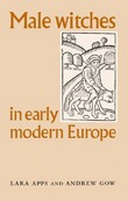Explore

Male Witches in Early Modern Europe
Lara Apps and Andrew Gow
2003
1 Ungluer has
Faved this Work
Login to Fave
Gender at stake critiques historians' assumptions about witch-hunting as well as their explanations for this complex and perplexing phenomenon. The authors insist on the centrality of gender, tradition and ideas about witches in the construction of the witch as a dangerous figure. They challenge the marginalisation of male witches by feminist and other historians. The book shows that large numbers of men were accused of witchcraft in their own right, in some regions, more men were accused than women. The authors analyse ideas about witches and witch prosecution as gendered artefacts of patriarchal societies under which both women and men suffered. They challenge recent arguments and current orthodoxies by applying crucial insights from feminist scholarship on gender to a selection of statistical arguments, social-historical explanations, traditional feminist history and primary sources, including trial records and demonological literature. The authors assessment of current orthodoxies concerning the causes and origins of witch-hunting will be of particular interest to scholars and students in undergraduate and graduate courses in early modern history, religion, culture, gender studies and methodology.
This book is included in DOAB.
Why read this book? Have your say.
You must be logged in to comment.
Rights Information
Are you the author or publisher of this work? If so, you can claim it as yours by registering as an Unglue.it rights holder.Downloads
This work has been downloaded 584 times via unglue.it ebook links.
- 204 - pdf (CC BY-NC-ND) at OAPEN Library.
Keywords
- Demonology
- early modern Europe
- early modern period
- European History
- gender
- gender, witchcraft
- History
- Humanities
- Literature
- Regional & national history
- Social conditions
- thema EDItEUR::N History and Archaeology::NH History::NHD European history
- Torture
- Witch-hunt
- Witchcraft
Links
DOI: 10.9760/mupoa/9780719057090Editions

